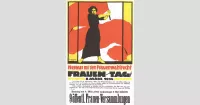Women's History Month is an annual celebration held in March in the US, UK, and Australia, and in October in Canada. It highlights the historical and contemporary achievements of women across various fields. The month corresponds with International Women's Day on March 8 and Persons Day in Canada on October 18. It is a time to recognize women's contributions to society.
1911: First International Women's Day
In 1911, the first International Women's Day occurred, marking the beginnings of what would become Women's History Month in the United States.
1963: Commission on the Status of Women Report
In 1963, a report was produced by the Commission on the Status of Women. This was the first comprehensive federal report on women until the report released by the Obama administration in March 2011.
1968: The Women's History Research Center
From 1968 to 1974, The Women's History Research Center, a central archive of the women's movement, was created as a result of Laura X's march.
1969: Laura X Organized a March in Berkeley, California
In 1969, Laura X organized a march in Berkeley, California, on International Women's Day, which had been largely forgotten in the United States before then.
1974: The Women's History Research Center Archive
From 1968 to 1974, The Women's History Research Center, a central archive of the women's movement, was created as a result of Laura X's march.
1978: Weeklong observance in Sonoma County, California
In 1978, a weeklong observance in Sonoma County, California, was held to honor women's history.
1978: Sonoma, California Participated in Women's History Week
In 1978, the school district of Sonoma, California, participated in Women's History Week, an event designed around the week of March 8 (International Women's Day).
1979: Women's History Conference
In 1979, a fifteen-day conference about women's history was held at Sarah Lawrence College from July 13 until July 29, chaired by historian Gerda Lerner. It was co-sponsored by Sarah Lawrence College, the Women's Action Alliance, and the Smithsonian Institution. Participants learned about the success of Sonoma County's Women's History Week celebration and initiated similar celebrations within their own organizations, communities, and school districts. They also agreed to support an effort to secure a National Women's History Week.
February 1980: President Jimmy Carter Issues a Presidential Proclamation
In February 1980, President Jimmy Carter issued a presidential proclamation declaring the week of March 8, 1980, as National Women's History Week.
March 8, 1980: National Women's History Week
President Jimmy Carter declared the week of March 8, 1980, as National Women's History Week.
1980: Archived 1980
In 1980, the information was archived.
1980: Championed as a National Week
In 1980, the weeklong observance that started in Sonoma County was championed by Gerda Lerner and the National Women's History Alliance to be recognized as a national week.
1981: Joint Congressional Resolution Proclaiming a Women's History Week
In 1981, responding to the growing popularity of Women's History Week, Sen. Orrin Hatch (R-Utah) and Rep Barbara Mikulski (D-Maryland) co-sponsored the first Joint Congressional Resolution proclaiming a Women's History Week.
March 7, 1982: President Proclaims Women's History Week
Starting March 7, 1982, the President proclaimed the week as Women's History Week.
1982: Archived 1982
In 1982, the information was archived.
1983: Archived 1983
In 1983, the information was archived.
1984: Archived 1984
In 1984, the information was archived.
1985: Archived 1985
In 1985, the information was archived.
1986: Fourteen States Declared March as Women's History Month
By 1986, fourteen states had declared March as Women's History Month.
1986: Archived 1986
In 1986, the information was archived.
March 1987: Congress Designated March as Women's History Month
In March 1987, Congress passed Pub. L. 100-9 which designated the month of March 1987 as Women's History Month.
March 1987: Women's History Month Started
In March 1987, Women's History Month officially started.
1987: Championed as a National Month
In 1987, the weeklong observance that started in Sonoma County, California, was championed to be recognized as a National Women's History Month.
1988: Annual Proclamations Designating March as Women's History Month
Between 1988 and 1994, Congress passed additional resolutions requesting and authorizing the President to proclaim March of each year as Women's History Month.
1988: Women's History Information Archived
In 1988, Women's History information was archived.
1989: Women's History Information Archived
In 1989, Women's History information was archived.
1990: Women's History Information Archived
In 1990, Women's History information was archived.
1991: Women's History Information Archived
In 1991, Women's History information was archived.
1992: Women's History Month Proclaimed in Canada
In 1992, Women's History Month was proclaimed in Canada to recognize the contributions of women and girls to Canadian society.
1992: Women's History Information Archived
In 1992, Women's History information was archived.
1993: Women's History Information Archived
In 1993, Women's History information was archived.
1994: Annual Proclamations Designating March as Women's History Month
Between 1988 and 1994, Congress passed additional resolutions requesting and authorizing the President to proclaim March of each year as Women's History Month.
1994: Women's History Information Archived
In 1994, Women's History information was archived.
1995: Women's History Information Archived
In 1995, Women's History information was archived.
1996: Women's History Information Archived
In 1996, Women's History information was archived.
1997: Women's History Information Archived
In 1997, Women's History information was archived.
1998: Women's History Information Archived
In 1998, Women's History information was archived.
1999: Women's History Information Archived
In 1999, Women's History information was archived.
2000: Women's History Month First Celebrated in Australia
In 2000, Women's History Month was first celebrated in Australia, initiated by Helen Leonard and the National Women's Media Centre, working with the Women's Electoral Lobby.
2000: Women's History Information Archived
In 2000, Women's History information was archived.
2001: Women's History Information Archived
In 2001, Women's History information was archived.
2002: Women's History Information Archived
In 2002, Women's History information was archived.
2003: Women's History Information Archived
In 2003, Women's History information was archived.
2004: Women's History Information Archived
In 2004, Women's History information was archived.
2005: Women's History Information Archived
In 2005, Women's History information was archived.
2005: Annual Celebration of Women's History Month in Australia
Since 2005, the annual celebration of Women's History Month in Australia has centered on a different area of women's achievement.
2006: Women's History Information Archived
In 2006, Women's History information was archived.
2007: Women's History Information Archived
In 2007, Women's History information was archived.
2008: Women's History Information Archived
In 2008, Women's History information was archived.
2009: Women's History Information Archived
In 2009, Women's History information was archived.
2010: Women's History Information Archived
In 2010, Women's History information was archived.
March 2011: Women in America: Indicators of Social and Economic Well-Being
In March 2011, the Obama administration released a report, Women in America: Indicators of Social and Economic Well-Being, showing women's status in the U.S. in 2011 and how it had changed over time.
2011: Women's History Information Archived
In 2011, Women's History information was archived.
2012: Women's History Information Archived
In 2012, Women's History information was archived.
2013: Women's History Information Archived
In 2013, Women's History information was archived.
2014: Women's "History Month Finale: The Great Debate 2014"
In 2014, AWHF hosted Women's "History Month Finale: The Great Debate 2014", marking the end of its official commemorations.
2014: Women's History Information Archived
In 2014, Women's History information was archived.
2014: Archived 2014
In 2014, the information was archived.
2015: Women's History Information Archived
In 2015, Women's History information was archived.
2015: Archived 2015
In 2015, the information was archived.
2016: Women's History Information Archived
In 2016, Women's History information was archived.
2017: Women's History Information Archived
In 2017, Women's History information was archived.
2018: Women's History Information Archived
In 2018, Women's History information was archived.
2019: Women's History Information Archived
In 2019, Women's History information was archived.
2020: Women's History Information Archived
In 2020, Women's History information was archived.
2021: Women's History Information Archived
In 2021, Women's History information was archived.
2021: Women's History Month Celebrated in Hungary
In 2021, the archaeologists of the Szent István Király Museum (Székesfehérvár) made several Facebook posts in honor of Women's History Month, the first time in Hungary.
2022: Women's History Information Archived
In 2022, Women's History information was archived.
2023: Women's History Information Archived
In 2023, Women's History information was archived.
2024: Women's History Information Archived
In 2024, Women's History information was archived.
2025: Women's History Information Archived
In 2025, Women's History information was archived.
Mentioned in this timeline
Facebook is a social media and networking service created in...
California is a U S state on the Pacific Coast...

Jimmy Carter the th U S President - was a...
Australia officially the Commonwealth of Australia encompasses the Australian mainland...

International Women's Day IWD celebrated annually on March th is...
Russia officially the Russian Federation spans Eastern Europe and North...
Trending
29 minutes ago Ski Mountaineering to Debut at Milan-Cortina Winter Olympics in 2026.

1 hour ago Selena Gomez's Spiced-Plum Manicure and TikTok Clone Theory Spark Buzz

1 hour ago Kit Harington and Sophie Turner Gag After On-Screen Kiss in New Movie

1 hour ago Trump administration updates, Iran nuclear efforts, and White House controversies unfold.

1 hour ago Dario Amodei Highlights India's Central Role in Shaping AI's Future at AI Summit.

2 hours ago Yoon Suk Yeol, South Korean ex-president, receives life sentence for insurrection and martial law.
Popular

Jesse Jackson is an American civil rights activist politician and...
Randall Adam Fine is an American politician a Republican who...

Pam Bondi is an American attorney lobbyist and politician currently...

Barack Obama the th U S President - was the...

Martin Luther King Jr was a pivotal leader in the...

Ken Paxton is an American politician and lawyer serving as...